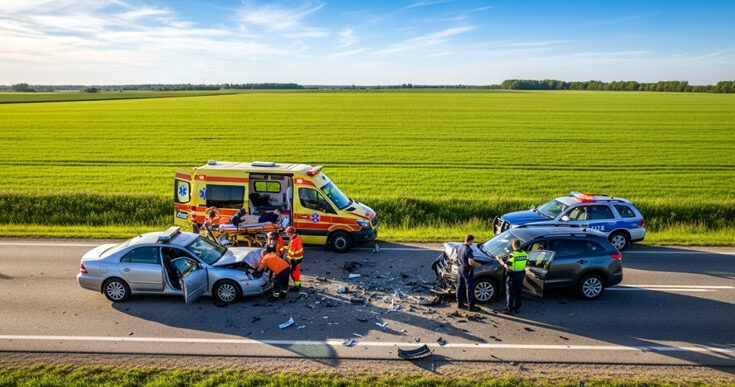Car crashes can happen in seconds, yet the impact can last for years. From medical bills to lost income, the consequences of an accident often extend beyond physical injuries. For many people in Rock Hill, filing a personal injury claim is the first step toward rebuilding stability after such an event.
Knowing how to move forward is not always simple. A clear grasp of the claim process, the laws that apply, and the steps involved can protect your rights and improve your chances of securing fair compensation.
What Should You Do Immediately After a Car Crash
The moments following a collision are often stressful, but the actions you take can strongly influence your personal injury claim. Calling 911 ensures law enforcement documents the incident, and seeking medical care creates a record of your injuries. South Carolina law requires drivers to report accidents involving injury or death, which makes obtaining a police report essential.
It’s equally important to gather evidence. Photos of the vehicles, road conditions, and visible injuries can serve as strong support later. Exchanging information with other drivers and noting witness details can also strengthen your case.
Consulting with a Rock Hill SC personal injury lawyer at Stewart Law Offices early can strengthen your claim, prevent costly missteps, and make sure every legal step is handled with precision. If you’d like personal guidance with your case, you can visit their office at 1242 Ebenezer Rd, Rock Hill, SC 29732, or call at +1 803-328-5600 to speak with their team directly.
How Does the Personal Injury Claim Process Work
Filing a claim is not a single step but a series of actions that build on each other. Understanding each phase ensures you can move forward with confidence rather than confusion. Here are the stages you need to be aware of:
Reporting the Accident
Notify the insurance company soon after the crash. Quick reporting prevents them from arguing that delays weakened your claim. Keep the details factual, avoid admitting fault, and make sure a police report is included for stronger support.
Collecting Documentation
A strong case depends on solid documentation. Police reports, medical records, and photos create clear links between the accident and your injuries. Consistency in records helps establish liability and prevents insurers from questioning the seriousness of your damages.
Filing the Claim
The claim is formally submitted to the at-fault driver’s insurance provider. It must outline your injuries, damages, and compensation sought. Any inaccuracies or missing details can cause delays or denials, making accuracy and organization essential at this stage.
Negotiating a Settlement
Insurance adjusters often undervalue claims to protect company profits. Skilled representation ensures the negotiations reflect your true losses, including medical expenses and income disruption, rather than the insurer’s lowest offer. Proper advocacy can significantly influence your final compensation outcome.
When Should You Seek Medical Care
Medical treatment is not only about health but also about strengthening your case. Even if you feel fine, certain injuries, like whiplash or internal trauma, may appear days later. Seeing a doctor immediately creates a professional record connecting your injuries to the crash.
Doctors’ notes, hospital bills, and prescribed treatment plans become evidence to support your claim. If you delay seeking care, insurers may argue your injuries were not serious or unrelated to the accident, making it harder to recover fair compensation.
Why Evidence is Key for a Strong Claim
Evidence is the backbone of a personal injury claim, shaping how insurers and courts evaluate your case. Without strong proof, your claim may be reduced to personal statements, which hold little weight. Solid evidence establishes fault, outlines damages, and confirms the seriousness of injuries, giving your claim legal credibility from the start.
Key forms of evidence include accident reports documenting conditions and potential violations, witness statements that support your version of events, and medical records directly connecting injuries to the crash. Under the South Carolina Rules of Evidence, such documentation carries significant weight, making it harder for insurers to dispute compensation.

Where Does South Carolina Law Apply in Personal Injury Cases
South Carolina follows a comparative negligence rule, meaning your compensation may be reduced if you are found partially at fault. In South Carolina, if you are found 20% responsible for a crash, your total recovery (say $100,000) is reduced by that 20%, leaving you with $80,000. Under South Carolina Code § 15-38-15, you cannot recover any damages if your fault reaches or exceeds 51%.
State data highlights the seriousness of these cases. In 2022, South Carolina recorded 50,172 traffic-related injuries, according to the Department of Public Safety’s Traffic Collision Fact Book. Understanding your rights under the law ensures you know what to expect when filing a claim.
How Long Do You Have to File a Claim
Timing matters. In South Carolina, the statute of limitations for personal injury cases is generally three years from the date of the accident. Missing this deadline usually means losing your right to compensation, no matter how strong your evidence may be.
Acting quickly also ensures witnesses remember details, medical records are preserved, and insurance negotiations stay fresh. Waiting too long can weaken your claim and make recovery more difficult.
FAQs
How long does it take to settle a personal injury claim in Rock Hill?
The timeline varies, depending on medical treatment, investigation, and negotiation. Some cases resolve in a few months, while others take over a year if litigation is required.
What damages can I recover in a car crash claim?
Compensation may cover medical expenses, lost income, pain and suffering, and property damage. In serious cases, long-term care costs may also be included.
Do I need a lawyer to file a claim?
While it’s possible to file without one, insurance companies often pay less when claimants represent themselves. Having legal support can increase the value of your settlement.
What if the other driver was uninsured?
You may still recover compensation through your uninsured motorist coverage. This is included in most South Carolina auto insurance policies, protecting you in such cases.
Conclusion
Filing a personal injury claim after a Rock Hill car crash requires quick action, strong evidence, and an understanding of South Carolina law. From reporting the accident to securing medical care and negotiating with insurers, every step matters in protecting your future.
Acting within the legal timeframe and seeking proper representation can make the difference between an underpaid claim and a fair settlement. By following the right process, you strengthen your chance of rebuilding stability after a serious accident.









